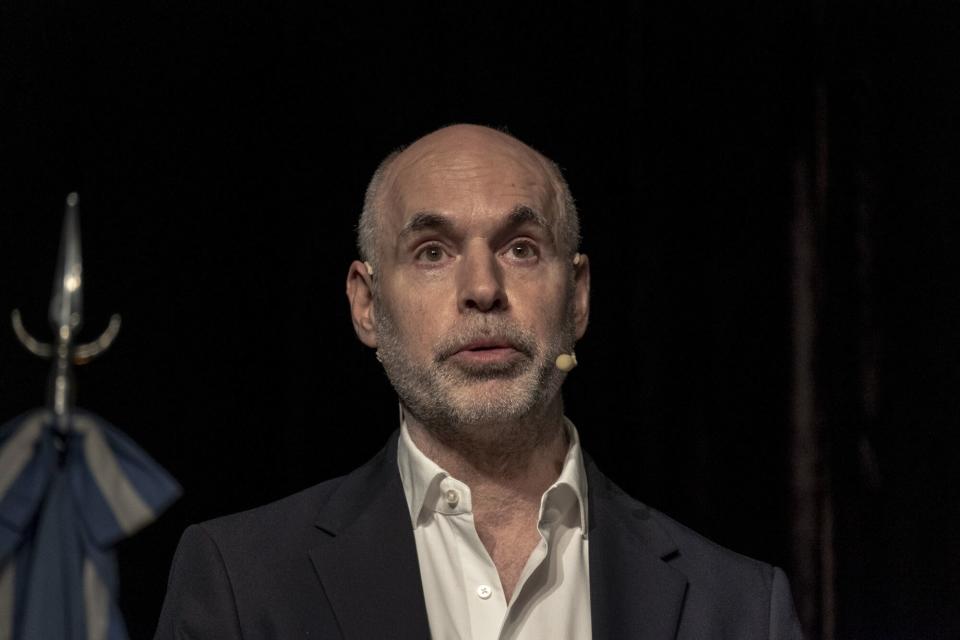Argentina Opposition Infighting Is Hurting Its Election Chances
(Bloomberg) -- Argentina’s main opposition coalition is beset by infighting that puts at risk what would otherwise be a landslide election victory for the business-friendly group, according to a top local pollster.
Most Read from Bloomberg
Meta’s Threads App Draws Millions Seeking a Twitter Alternative
Ukraine Has Caught Up With Russia’s Tank Numbers, Data Signal
Stocks Stumble as Traders Turn to Payroll Data: Markets Wrap
Biden Set to Send Cluster Munitions to Ukraine Despite Concern
Musk Ultimatum to Taiwan Imperils Its Push to War-Proof Internet
“The opposition should easily win this election,” said Alejandro Catterberg, director of Buenos Aires-based polling firm Poliarquia. “Instead, we have a lot of uncertainty, especially because its strategy is wrong.”
While Catterberg’s base case remains that the pro-business bloc Juntos por el Cambio, or Together for Change, will win this year’s general election, doubts are ballooning. A bitter primary battle between its two presidential hopefuls means that whoever eventually becomes the candidate may fail to retain all the votes currently split between them, he said.
Candidates Horacio Rodriguez Larreta and Patricia Bullrich face off in the Aug. 13 primary that will define who goes onto Argentina’s Oct. 22 general election. About 30% of those supporting either Larreta or Bullrich say they won’t vote for the other candidate after the primary, Catterberg said, citing his polls.
One of Larreta’s advisers said his team is losing confidence that, if he wins the primary, Bullrich and her supporters would back him in October. The adviser, who asked not to be named to speak candidly, conceded that the party’s polarizing primary could cost it what he called the easiest election to win.
Bullrich has justified the current power struggle by saying the primary vote will determine much more than the opposition candidate.
“It’s clear that there’s a strong debate and tension because whoever wins our primary will very likely be the next president of Argentina,” she said during a television interview Monday.
Larreta’s press office declined to comment, while representatives for Bullrich didn’t provide comment.
Read more: Argentina Election’s Rightward Shift Spurs Investor Optimism
Opposition’s Edge
A spiraling economic crisis compounded by inflation running at more than 100% a year has hurt reelection prospects for the ruling Peronist coalition of President Alberto Fernandez and Vice President Cristina Fernandez de Kirchner. It has also given the opposition a clear path to victory, one that some investors consider likely to remain open regardless of the political drama.
“The opposition’s infighting will get resolved after the primary,” said Fernando Losada, managing director at Oppenheimer & Co. “Those who today say they won’t vote for Patricia or Horacio are actually more worried about repeating a Kirchner government.”
But even the Peronists, for years plagued by their own infighting, set aside differences in June to unite behind Economy Minister Sergio Massa as their candidate. On the other end of the political spectrum, far-right contender Javier Milei is pulling some votes away from the main opposition coalition.
Meanwhile, Larreta and Bullrich have grown more vitriolic in their mutual attacks. Bullrich’s candidate for governor in one Argentine province has said she won’t back Larreta’s candidate, citing “moral and ethical differences.”
Last week, Larreta lambasted Bullrich’s campaign by tying her proposals to those of former President Mauricio Macri.
“She proposes the same model that already failed in Argentina,” he said in a radio interview.
Bullrich doubled down in an interview with Clarin newspaper, calling Larreta an “opportunist” willing to “do anything for a vote.” Previously, Bullrich had criticized Larreta for being friends with Massa, saying their opposition coalition should not be a “formless amoeba.”
Read more: Argentine Economic Chaos Fuels Hard-Liner’s Presidential Bid
One open question is where do Larreta or Bullrich voters go after the primary if they don’t support the other. While some pollsters see a bloc of Larreta’s centrist-minded voters migrating toward Massa and Bullrich’s far-right supporters backing Milei, Catterberg says those votes could fragment across the political spectrum.
Despite all their problems, the Peronists “avoided the worst scenario possible for them of going into an internal battle attacking each other,” Catterberg added. “The opposition coalition did not. If they do poorly, many of their leaders are going to have to pay the consequences.”
Most Read from Bloomberg Businessweek
How Mobile Money Is Bringing Electricity to the World’s Poorest
A Pop-Up Concert Company Gives Bands a Place to Perform, and 70% of the Profit
The Air Jordan Drop So Hot It Blew Up an Alleged $85 Million Ponzi Scheme
How a Prison Gang Inspired by Hollywood Heists Stole $23 Million
©2023 Bloomberg L.P.





